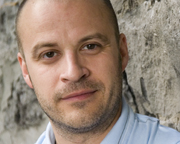Tim Lougheed
The University of Ottawa’s Excellence in Education prizes recognize educators of exceptional quality, who provide outstanding teaching while maintaining a solid research program. Profiles of each of the nine prize winners in 2007 will appear in the Gazette over the coming months.
 |
|
At its loftiest and most refined, nursing is about helping those too sick to care for themselves. Day to day, however, the profession includes such grim business as draining open wounds or emptying bedpans.
And Dave Holmes, an associate professor in the School of Nursing, eagerly alerts his students to even grittier aspects of this work: the sometimes brutal politics of health care institutions.
“Hospitals are supposedly caring for patients, but at the same time not so caring for the nursing staff,” he explains, citing examples such as chaotic schedules and relentless overtime demands. In fact, he sees most nurses as engaged in a struggle for autonomy and control over their working lives, a struggle that defines how well they can carry out their jobs.
This is not how most people envision a career in nursing, which is exactly why Holmes feels the need to present it to his classes in detail. Let the rest of the curriculum inform students about the profession’s technical demands; he offers a perspective on even more fundamental challenges.
“I am trying to show them what nursing is in real life,” he says. “I want them to reflect on what they do. I want them to see the patient and to adapt and craft their practice to what they see. I’d like them to think that nursing is part of society, that nurses have to be involved in social justice and political action. I want them to be able to be agents of change.”
His call to consciousness regularly wins praise from students, and now Professor Holmes has become one of this year’s recipients of the University of Ottawa’s Excellence in Education Prize.
Professor Holmes does not shy away from controversy in his observations, pointing to cases such as new mothers who are chided by doctors and nurses alike for any reluctance to breastfeed their babies, whereas a generation ago breastfeeding was almost entirely taboo in both professions. By placing the current belief ahead of the individual’s wishes, Holmes concludes these health care practitioners have lost their ability to empathize with the very people for whom they are supposed to care. It is a quality he seeks to preserve in the next generation of nurses.
“I’d like them to be sensitive and remain sensitive to this,” he says, adding that he wants to ensure that they will be capable of questioning anything around them. “When you stop asking questions about what’s going on, that’s very dangerous.”
Related Links: